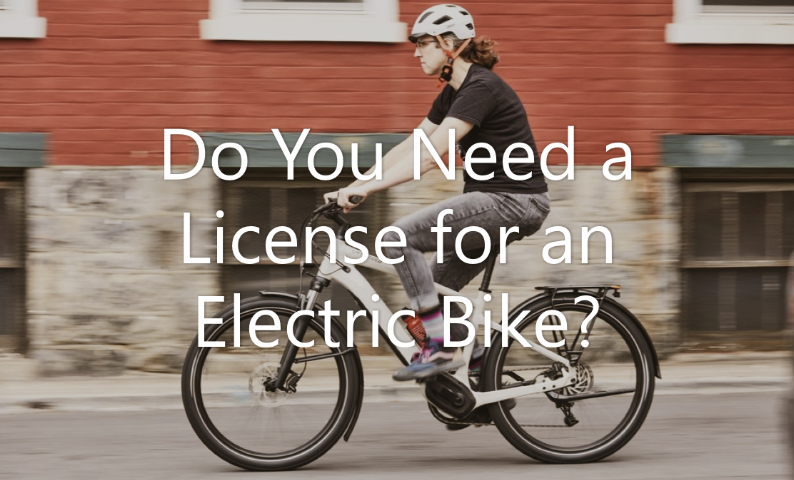Do You Need a License for an Electric Bike?

Electric bicycles, also known as e-bikes, have been on a surge of popularity due to their appeal as an eco-friendly and convenient mode of transport. However, when it comes to regulation and the need for a license, there are varying rules worldwide. In this article, we will delve into the legalities surrounding e-bikes, focusing mainly on regulations in the United States, Europe, and other significant regions. So, Do you need a license for an electric bike?
Understanding Electric Bikes
Before delving into the licensing requirements, it’s crucial to understand what constitutes an electric bike. E-bikes are bicycles equipped with a battery and an electric motor. They fall into three main classes:
- Pedal Assist/Pedelec: The motor provides assistance only when the rider is pedaling and stops assisting at a speed of 20 mph.
- Throttle: The motor can propel the bike even without pedaling, but stops assisting at a speed of 20 mph.
- Speed Pedelec: The motor assists while pedaling and stops assisting at a speed of 28 mph.
E-Bike Regulations in the United States
In the United States, federal law classifies e-bikes as bicycles rather than motor vehicles if they have a top assisted speed of 20 mph and a motor power not exceeding 750 watts. Therefore, they are generally not subject to the same licensing, insurance, or registration requirements as traditional motor vehicles.
However, state laws vary. While many states align with the federal law, some have their own regulations, including restrictions based on the e-bike’s class. Certain states require riders of Class 3 e-bikes to have a license, registration, and insurance. It’s essential to check local laws and regulations before purchasing and operating an e-bike.
E-Bike Regulations in Europe
In Europe, the situation is slightly different. E-bikes are divided into two categories: pedelecs and S-pedelecs. Pedelecs are similar to the Class 1 e-bikes in the U.S., assisting up to 25 km/h with a motor power of up to 250 watts. On the other hand, S-pedelecs can assist up to 45 km/h.
Pedelecs do not require a license, insurance, or registration in most European countries as they’re treated as conventional bikes. However, S-pedelecs, due to their higher speed, are often treated as mopeds. Riders may need a suitable driving license, mandatory insurance, and a license plate. Helmet use is also usually required.
E-Bike Regulations in Other Regions
For other parts of the world, regulations may also vary. Some countries might require all e-bike riders to have a license and insurance, while others don’t require anything at all. It is always best to check local regulations before deciding to purchase or ride an e-bike.
Safety Considerations and Legislation
Even in regions where e-bikes do not require a special license, it is important to note that general traffic rules still apply. Regardless of where you are in the world, when you’re riding an e-bike on public roads, you should adhere to all traffic laws, signals, and road markings just as you would when driving a car.
Some areas have specific regulations regarding the use of e-bikes on trails, sidewalks, and bike paths. For instance, some cities only allow Class 1 e-bikes on bike paths, while Class 2 and 3 e-bikes are restricted to the road. Additionally, there may be age restrictions in place, with some regions not allowing riders under a certain age to operate an e-bike.
Helmet use is another area where the law can vary greatly. Some regions require all e-bike riders to wear helmets, while others only require it for certain classes of e-bike or for riders below a certain age.
E-Bike Insurance
Although not always required by law, it is wise to consider insurance for your e-bike. Even if licensing isn’t necessary, having insurance can protect you from potential liability if you were to have an accident. Additionally, because e-bikes can be quite expensive, insurance can offer protection against theft or damage.
Many household contents insurance policies will not cover e-bikes, especially when used away from home, so it may be necessary to take out a separate, specific e-bike insurance policy. As with all insurance policies, the coverage will vary, so it’s important to read the terms and conditions carefully.
Conclusion: Do You Need a License for an Electric Bike?
The need for a license to ride an electric bike depends largely on where you live and the specific class or type of e-bike you ride. As e-bikes continue to grow in popularity, the laws surrounding them are likely to evolve, so it’s always crucial to stay updated with local regulations.
For many, the benefits of e-bikes, including the potential for a faster commute, lower carbon footprint, and improved fitness, far outweigh the complexities of navigating their legalities. Just make sure you’re informed and compliant to ensure a smooth ride ahead.
